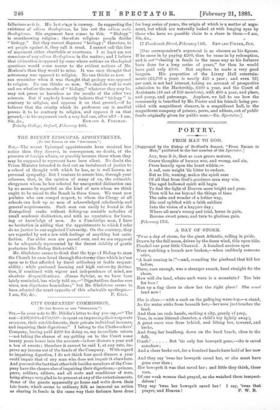CITY COMPANIES' COMMISSION.
[To THE EDITOR OF THE " spEcreTov."1 SIR,—In your note to Mr. Dibdin's letter to-day you say,—" The rest—£400,000 to £150,000—is spent on improving their corporate revenues, their establishments, their private individual incomes, and impairing their digestions." I belong to the Clothworkers'. Company, having paid £200 for doing so, my immediate return —not taking the chance of my getting on to the Court some twenty years hence into the account—is four dinners a year and a box of sweets ; therefore it cannot be said I, at any rate, improve my income out of the funds of the Company. With regard to impairing digestion, I do not think four good dinners a year could impair that of any man who does not impair it elsewhere. And you omit the fact that other folk besides members of the Company have the chance also of impairing their digestions,—princes, peers, soldiers, editors, and all sorts and conditions of men, being always very glad to be present at any of the entertainments. Some of the guests apparently go home and write down their late hosts, which seems to ordinary folk as immoral an action as sharing in funds in the same way their forbears have done for long series of years, the origin of which is a matter of argument, but which are naturally looked at with longing eyes by those who have no possible claim to a share in them.—I am, Sir, &c., 17 Fenchurch Street, February141h. EDWARD FOSTER, JUN.
[Oar correspondent's argument is as obscure as his figures. If he came in by paying 11200, then he came in by redemption, and is not "sharing in funds in the same way as his forbears have done for a long series of years," for then he would have paid only £100. But anyhow, he made a very good bargain. His proportion of the Livery Hall entertainments (0,700 a year) is nearly. £25 a year ; and even 121 per cent. is not bad interest, taking no account of prospective admission to the Mastership, £400 a year, and the Court of Assistants (44 out of 150 members), with £80 a year, and place, and pomp, and patronage. Anyhow, we fail to see how the community is benefited by Mr. Foster and his friends being provided with magnificent dinners, in a magnificent hall, in the magnificent company of princes, peers, and editors, out of public funds originally given for public uses.—En. Spectator.]


































 Previous page
Previous page